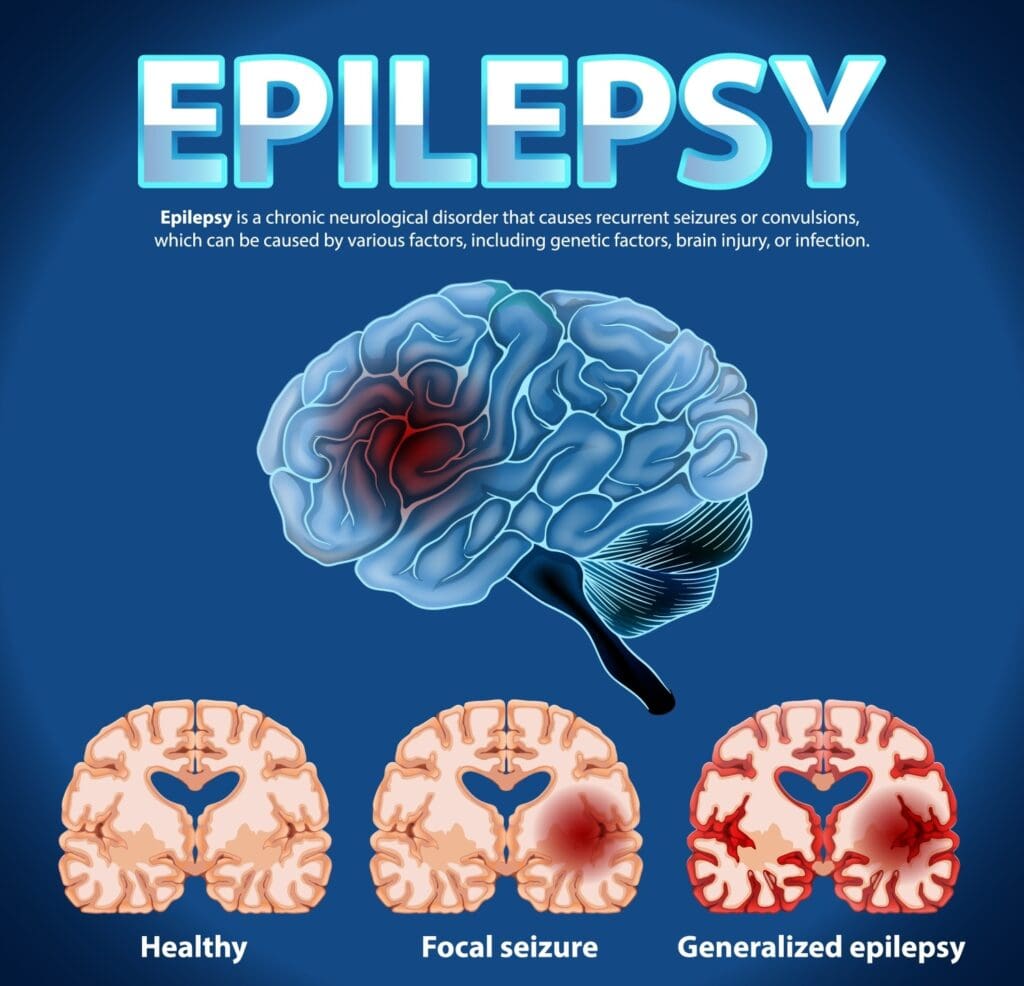Epilepsy, although a neurological condition, is not always considered as a mere health challenge in many African communities.
In Nigeria, even the advancement of modern knowledge through science and technologies, there still exist so many age-long ideologies about this brain disorder.
Many believe that epileptic experience is either a spiritual attack or demonic possession, while Neurologist and Brain Health Advocates have dismissed this notion through health education, the society is still hostile to an epileptic patient.
Indeed, no one wishes to be an epileptic patient, as we all strive to be mentally, physically and emotionally healthy however, it is rather disheartening to note that an estimated 8 in every 1000 people in Nigeria have epilepsy.
Yes, as shocking as it may sound, epileptic condition is a very common health challenge, affecting millions of people around the world, and Nigerians are not excluded.
Despite its prevalence, there’s still a lot of misunderstanding surrounding this health condition, especially in Nigerian society, making life more difficult for epileptic patients due to the societal stigma.
In advocacy for a better living conditions for epileptic patients, this article aims to shed light on epileptic conditions, clear up common misconceptions, and empower Nigerians to better understand this neurological disorder.
What is Epilepsy
Epilepsy is a brain disorder that causes unexpected seizures. Seizures are sudden bursts of electrical activity in the brain that disrupt normal function.
These seizures can take different forms and happen at different frequencies from person to person. It often leads to changes in awareness, strange feelings, or loss of control over one’s body.

This can lead to a variety of symptoms, including uncontrolled muscle movements, loss of consciousness, and strange sensations.
While there seems to be no cure for epilepsy, it can often be managed with medication, lifestyle changes, and sometimes surgery.
People with epileptic syndrome should work closely with healthcare professionals to find the best treatment plan for their individual needs.
What Causes Epilepsy?
The exact cause of epilepsy is not always known. However, several factors can contribute to its development, including:
- Scarring in the brain: This can be caused by a head injury, stroke, infection, or brain tumors.
- Genetic factors: A family history of epilepsy increases your risk.
- Developmental problems: Brain development issues that occur before birth can also play a role.
- Infections: Certain infections, such as meningitis, can damage the brain and lead to epilepsy.
- Metabolic disorders: These are conditions that affect how the body uses energy, and some can disrupt brain function and cause seizures.
What are the Symptoms of Epilepsy?
The symptoms of this brain disorder vary depending on the type of seizure a person experiences. Here’s a breakdown of the main seizure types:
- Focal seizures: These start in a specific part of the brain and can cause a variety of symptoms, including twitching of a limb, strange sensations, or changes in mood or behavior.
- Generalized seizures: These involve the entire brain and can cause a loss of consciousness, jerking movements of the arms and legs, or stiffening of the body.
- Absence seizures: These are brief lapses of consciousness where a person may stare blankly for a few seconds.
It’s important to note that not everyone with epileptic experiences seizures in the same way. Some people may only have one type of seizure, while others may have multiple types.
Living with Epileptic Conditions in Nigeria
Living as an epileptic patient in Nigeria can be particularly challenging due to the stigma often associated with the condition. Here are some of the common misconceptions:
- Epilepsy is contagious: Epilepsy is not contagious and cannot be spread through touch or contact.
- Epilepsy is a sign of spiritual possession: Epilepsy is a neurological disorder, not a spiritual issue.
- People with epilepsy cannot live normal lives: With proper treatment, most people with epileptic condition can live full and productive lives.
Diagnosis and Treatment of Epilepsy
If you suspect you or someone you know may be epileptic, it’s important to see a doctor for a diagnosis. The doctor will likely ask about your medical history and symptoms, and may order tests such as an EEG (electroencephalogram) to measure the electrical activity in the brain.

There is no cure for epileptic conditions, but there are effective treatments available to control seizures. These treatments include:
- Medication: Anti-seizure medications are the most common treatment for epileptic patients.
- Surgery: In some cases, surgery may be an option to remove the part of the brain that is causing seizures.
- Dietary therapy: A special diet, such as the ketogenic diet, can help to control seizures in some people.
Living Well with Epilepsy
Living with epilepsy can be tough because people with epileptic condition can have unexpected seizures that are different from person to person.
Epilepsy can affect daily life in different ways depending on how often seizures happen, how well treatment works, and if there are other health issues involved.
There are several things you can do to manage epileptic conditions and live a healthy life:
- Take your medication as prescribed by your doctor.
- Get enough sleep.
- Manage stress.
- Avoid triggers that may cause seizures, such as flashing lights or lack of sleep.
The Role of Family and Friends
Family and friends can play a vital role in supporting an epileptic patient. Here are some ways you can help:
- Learn about epilepsy: The more you know about the condition, the better equipped you will be to support your loved one.
- Be patient and understanding: Epilepsy can be a frustrating and isolating condition. Be patient with your loved one and offer your support.
- Help them manage their seizures: This may involve helping them take their medication or creating a safe environment in case they have a seizure.
Coping with Stigma
The stigma surrounding this brain disorder can be a significant burden for Nigerians living with the condition. Here are some tips for coping:
- Educate yourself and others: The more people understand about epileptic condition, the less stigma there will be.
- Connect with others: There are support groups for people with epileptic conditions in Nigeria. Connecting with others who understand what you’re going through can be very helpful.
- Focus on your health: Don’t let the stigma of epileptic condition define you. Focus on taking care of yourself and living your life to the fullest.
Finding Help and Resources in Nigeria
While Life can be challenging for an epileptic patient in Nigeria due to limited resources and societal stigma, there are organizations and support systems available. Here are some helpful resources:
- Teaching Hospitals: Major teaching hospitals in Nigeria, like those in Lagos and Ibadan, often have neurology departments that can diagnose and treat epileptic condition.
- Nigerian Neurological Society (NNS): The NNS is a professional organization of neurologists in Nigeria. They can provide information on finding a qualified neurologist in your area.
- Epilepsy Foundation of Nigeria (EFN): The Epilepsy Foundation Nigeria is a patient advocacy group dedicated to raising awareness and improving the lives of people with epilepsy in Nigeria. They offer support groups and educational resources.
Important Considerations
- Traditional Medicine: Traditional medicine is widely used in Nigeria. It’s important to consult with a qualified healthcare professional before using any traditional medicine for an epileptic condition. Some traditional remedies may interact with anti-seizure medications or be harmful.
- Pregnancy: Epilepsy can be managed safely during pregnancy with proper medical care. It’s important to talk to your doctor about any concerns you have about pregnancy and epilepsy.
- Driving: There may be restrictions on driving for people with an epileptic condition, depending on the severity and frequency of their seizures. Always consult with your doctor to determine if it’s safe for you to drive.
Conclusion
Epilepsy is a serious neurological condition, but it is not a life sentence. With proper diagnosis, treatment, and support, most people with epilepsy can live full and productive lives.
Remember:
- Epilepsy is a common neurological condition, not a spiritual curse.
- There is no single cause of epilepsy, but several factors can contribute to it.
- The symptoms of epilepsy vary depending on the type of seizure.
- Epilepsy is not contagious and cannot be spread through touch or contact.
- With proper treatment, most people with epileptic condition can live normal lives.
- There are resources available in Nigeria to support people with epileptic conditions and their families.
By working together, we can create a more understanding and supportive environment for Nigerians living with epilepsy.
Additional Resources:
- World Health Organization (WHO): https://www.who.int/health-topics/epilepsy
- International League Against Epilepsy (ILAE): https://www.ilae.org/guidelines/definition-and-classification
Disclaimer: This information is not intended to be a substitute for professional medical advice. Always consult with your doctor about any health concerns you may have.



